Rutgers-Camden
Department of Sociology, Anthropology and Criminal Justice
Spring 2009 Newsletter
|
|
Dr. Bluebond-Langner
Dr. Humphries
Visiting Scholar
Free Books
Caputo Helm
The CJO
Summer Courses
Fall Notes
Faculty Research
Save the Dates
Masterton Awards
Computer Lab
Being Deviant
Internship
Student News
|

Dr. Bluebond-Langner Receives the University’s Highest Research Award
Excellence in Research: Dr. Myra Bluebond-Langner, Distinguished Professor of Anthropology, is the recipient of the Board of Trustees Award for Excellence in Research, the highest research honor the university confers. The award was given to Professor Bluebond-Langner in recognition of her pioneering accomplishments in medical anthropology, childhood studies and bioethics, which together have had considerable impact within various academic disciplines as well as in the practice of medicine and research with children.
Professor Bluebond-Langner’s research career has focused on childhood illness, both chronic and terminal. Utilizing the tools of an ethnographer, Professor Bluebond-Langner has succeeded in penetrating the worlds of ill and dying children, their families and the medical professionals involved in their care. In doing so, she has enabled the world to hear the voices of children who previously had been silenced despite having been the subjects of research. Her work has not only made substantial contributions to anthropology – both substantively and methodologically – but also has profoundly influenced the medical treatment that seriously ill children receive and contributed to a serious examination of numerous ethical questions related to children’s participation in clinical trials and research. Her two best known books, The Private Worlds of Dying Children (Princeton University Press, 1978,) and In the Shadow of Illness: Parents and Siblings of the Chronically Ill Child (Princeton University Press, 1996), profoundly changed the ways in which the world viewed children’s perceptions of their illnesses and the effect of these illnesses on their families.
In a recently completed recent research project, Professor Bluebond-Langner, together with a colleague in London, spent months observing physicians, families and children in hospitals both here and in England as they grappled with the difficult decisions that confront parents and children who have cancer that is probably not curable. Her work on this project has already produced findings that have influenced the medical profession’s views on treating children with cancer and led to an invitation to an endowed lecture at the Stanford University School of Medicine this fall. In addition to that lecture, Professor Bluebond-Langner was invited to conduct Grand Rounds at the medical schools of Harvard University, Johns Hopkins University and the University of Toronto this fall. She is in demand both here and abroad as a keynote speaker and guest lecturer.
Professor Bluebond-Langner’s newest research reflects her willingness to take on methodological challenges. In it, she is training inner city adolescents to work as researchers investigating children’s decision making about when and how they choose to seek medical assistance for routine ailments and injuries. As with her previous work, this is uncharted territory that promises to contribute knowledge that will help shape both health care policy and practice in addition to providing new models for methodological innovation in anthropological research.
In addition to her influence in the medical, anthropological and bioethical fields, Professor Bluebond-Langner’s research helped to establish the field of childhood studies as a bona fide academic discipline, with Rutgers leading the way in the United States by establishing the country’s first doctoral program in childhood studies. She was the founder and first director of the Center for Children and Childhood Studies at Rutgers, which has achieved an acclaimed reputation both here and abroad. In addition, she is editor of the well regarded series on childhood studies published by Rutgers University Press.
Professor Bluebond-Langner has been the recipient of numerous grants from a diverse range of funding sources, including the National Science Foundation and the National Endowment for the Humanities. Her work has been recognized as well by several awards, including the Margaret Mead Award from the American Anthropological Association and The Society for Applied Anthropology and the lifetime achievement award from Children’s Hospice International. Clearly, the Board of Trustees Award for Excellence in Research is fitting recognition of Professor Bluebond-Langner’s numerous and significant achievements in research. The department is honored that she chose to make Rutgers-Camden her academic home.
|
|
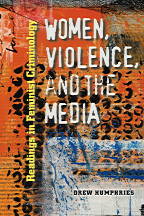
|
Dr. Humphries Publishes a new Book
Dr. Humphries has just published a new book, Women, Violence, and the Media: Readings in Feminist Criminology (University Press of New England). Through the lens of feminist criminology, this volume examines the complex interrelationship of women, violence, and media presentations. The book is divided into three sections. The first, “Gendering Constructions,” lays the groundwork for the volume by examining the print media’s presentation of gendered violence, female killers on Law and Order, African American women in Hollywood films, and women in media, crime, and violence textbooks. The second section, “Debating the Issues,” explores aspects of femicide, including mass murder incidents, domestic violence in Bangladesh, and wartime sexual violence in reality and on television. The final section “Changing the Image,” focuses on efforts to replace masculine assumptions with constructive approaches to imagining women.
|
|
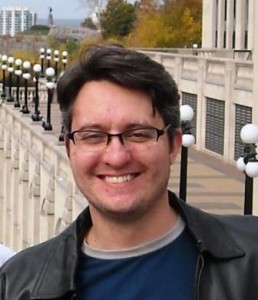

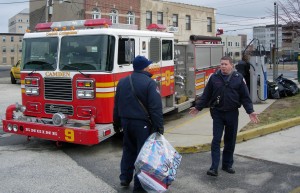
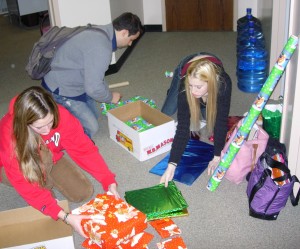
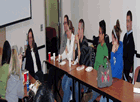
|
Visiting Scholar from Brazil The department will have a visiting scholar from Brazil in residence over the summer.André Zanetic is a doctoral student at the University of São Paulo, and has worked on studies of organized crime and public safety in Brazil. He is working with the well known Brazilian criminologist Tulio Khan who is research director for the Department of Criminal Justice of the state of São Paulo. Professor Ted Goertzel and Dr. Khan collaborated on a study of “The Great São Paulo Homicide Decline” which is forthcoming in the journal Homicide Studies. While he is in the United States, André will be studying private security services and other aspects of the American criminal justice system. He will be sharing Professor Goertzel’s office in the Criminal Justice building, right across from Sherry’s office. Be sure to welcome him if you see him there.
Free Sociology Books from Prof. Wood
As reported in the fall newsletter, Dr. Robert Wood is retiring at the end of this semester. He would like to pass on most of the books in his office to students. These books can be useful resources for current students, but may have special appeal for students planning to go on to graduate study and wishing to develop their sociological library. Interested students should either email Dr. Wood or talk to Sherry Pisacano in the departmental office about arranging a time to take what they want. The books range across a broad array of sociological subjects, but particularly emphasize sociological theory, social stratification, globalization and development, and technology and society. There are plastic bags available in the office, but feel free to bring you own boxes!
Caputo taking the Helm
Dr. Caputo takes the helm from Dr. Wood and now manages the Departmental newsletter and website. Dr. Meyer maintains the graduate website for criminal justice. Prof. Caputo invites contributions for newsletter items from students and alumni. The faculty thanks Dr. Wood for his dedicated service.
Things are happening in the CJO
The Criminal Justice Organization (CJO) has been particularly active this year. Our fall was devoted to service projects. Once again, we partnered with the Veterans For Education (V4E) club to collect hygiene and comfort items for military personnel serving in Iraq. In addition to the ever-popular baby wipes and other hygiene articles, we sent books, magazines, DVDs, CDs, snack foods, candy and handwritten holiday cards to those serving abroad for the holidays. The drive was a resounding success and it gave us an opportunity to work with the fine members of the V4E. We also collected boxes of food for as part of the Rutgers Against Hunger project. Finally, in conjunction with Dr. Meyer’s Theories of Crime and Delinquency class, we adopted a total of eight families for the holidays, providing gift cards, toys and other gifts to those in need. As we do each year, we requested families that had been touched by crime. After the Theories final exam, we took over the third-floor halls of the BSB building to wrap gifts while snacking on pizza. Then, the gifts were delivered to the local fire station for delivery by firemen working with Camden Angels. As the only person up early enough for the sorting activity, club advisor Dr. Jon’a Meyer got to ride on one of the fire trucks to deliver the gifts with the fun-loving, spirited firemen. The smiles and hugs and tears of happiness they encountered throughout the city were tremendous and reminded everyone present of the value of helping others.
For the spring, we resumed our speaker series. The club members insisted that our first speaker be Dr. Caputo, who spoke about her new book, Out in the Storm: Drug-addicted Women Living as Shoplifters and Sex Workers. The talk was a large draw, attracting both CJO members and some others who were interested in the fascinating topic. We have also hosted R.B., assistant case management coordinator at Fort Dix Federal Correctional Institution, who spoke about his job and experiences within the criminal justice system. Hopefully, our April speaker will be as popular as our first two.
This year, we received funding for a trip to the criminal justice mega-city,Washington, DC. On April 24th, a bus full of Rutgers-Camden students will travel to our nation’s capital to visit some of the most important places in the field of criminal justice, including offices and agencies belonging to the legislative, executive, and judicial branches. The majority of our members are most excited about touring the U.S. Supreme Court, though at least a few wouldn’t mind bumping into President (or even Mrs.) Obama. The trip will include some free time to explore our nation’s fine Smithsonian Institution member museums or other local attractions. The CJO is open to all students, regardless of major. For more information on the club, visithttps://clam.rutgers.edu/~cjoc/
|
|
|
Notable Summer Courses
Summertime may be a time for fun, but that doesn’t mean you can’t also do some studying. The department is offering 18 courses this summer. Some of the courses have never before been offered and others introduce new adjunct faculty to the campus, including:
-
Urban Sociology (50:920: 321) examines urban and suburban life in industrial and postindustrial environments along with social class, ethnic, and racial differences in communities. The course, which also looks at technological change and strategies for community and regional development, will be taught by Professor Nancy Reeves, who holds an undergraduate degree in sociology and an MA in Urban Studies. Professor Reeves has taught at several area universities and colleges. We welcome her to Rutgers-Camden for the first time.
-
Special Topics in Sociology: American Myths, Conspiracy Theories & Media Fabrications will explore, in a seminar form, why certain conspiracies, myths, and media creations are produced, the needs they might fill, and purposes they might serve, including political, psychological, social, and/or economic. The course will also analyze these conspiracy theories, myths, and media creations, exploring their development, credibility, and substance. Included in the course will be the the more widely accepted conspiracies theories surrounding the 9/11 attack and the JFK assassination; the myths concerning the Protocols of the Elders of Zion and the allegation that FDR had prior knowledge of the Pearl Harbor attack but purposely choose to not defend against it; and the media creation concerning the role of Joshua Chamberlain at Gettysburg. Professor Evan Laine, who taught the course titled Supreme Court and American Culture for us last semester, returns to teach this course (and will teach the Supreme Court course again this coming fall).
-
Special Topics in Criminal Justice: Criminal Procedure (50:202:355) will examine the legal procedures by which the criminal justice system operates. Issues regarding search and seizure of persons and premises, arrests, interrogation, bail, pre-trial, trial and post trial rights, and remedies available for constitutional violations will be explored focusing on the Fourth, Fifth, Sixth, Eighth and Fourteenth Amendments of the U.S. Constitution, landmark opinions of the U. S. Supreme Court, and the Federal Rules of Criminal Procedure. This course will be taught by Professor Lucy McClain, an Assistant United States Attorney in the Antitrust and Criminal Divisions whose specialty is prosecuting antitrust, fraud and other white collar crimes. Professor McClain taught White Collar Crime for the department last summer.
For those interested in doing a summer internship for credit, please contact Dr. Meloy by email for further information.
The full list of courses offered this summer, along with registration information, is available at the Summer Session’s website.
A Change to Summer Offerings
Dr. Caputo will be offering during Community Corrections (50:202:352) in the first session and Criminology (56:202:513) for graduate students in the second.
Fall Course Notes
The department will be offering a new course this fall: Criminal Investigation Practicum, taught by Professor Kevin Murphy, one of our adjunct instructors. The course will be open to juniors and seniors, but permission to register must be obtained from Professor Murphy. The practicum will provide students with an opportunity to conduct investigations in the representation of indigent juvenile defendants. Students will work closely with law students in the Children’s Justice Clinic at Rutgers School of Law and provide the investigation needed to insure the juveniles with effective representation.
The investigative tasks for each student will include reviewing discovery, locating and interviewing witnesses including fact, family and character witnesses, obtaining records, photography and sketching scenes, serving subpoenas, testifying and writing detailed reports. The students will have contact with professionals in the criminal justice system, clients, witnesses and record keepers. Professor Murphy, Chief Investigator for the Federal Public Defender in New Jersey, will provide both supervision and training. We believe this collaboration on actual cases between undergraduate and law students is the first of its kind in the country. It’s certainly a great opportunity for those who think they might like to pursue a career in investigation to get some exposure to the real thing.
Dr. Ted Goertzel’s two popular hybrid internet classes will be offered again in the fall semester. Because of the Labor Day weekend, the first meeting of both classes will be in the evening on Thursday during the first week of classes. Methods and Techniques of Social Research will meet at 6 p.m. on September 3 and from 9 to 11:30 in the morning on Saturdays October 3, November 14 and December 19. Cyberspace and Society will meet at 7:30 p.m. on September 3 and from 1 to 3:30 in the afternoon on Saturdays October 3, November 14, and December 19. The Methods and Techniques course covers the same material as the conventional class, and meets a degree requirement for both the Sociology and the Criminal Justice major. The Cyberspace and Society course counts towards the Sociology major or as an elective for the Criminal Justice major. Space in the Cyberspace and Society class is limited, so interested students are urged to register early. For more information on these courses, go to https://crab.rutgers.edu/~goertzel/HybridInternet.htm
A previous Masterton Award winner, Donna Gottardi, is returning to our department as a part-time instructor next semester. She’ll be teaching Introduction to Sociology in the fall. Please join us in welcoming Prof. Gottardi.
For the complete list of Fall 2009 courses, see the online schedule of classes.See also the Two Year Dept Schedule.
|
|
|
Some Recent Faculty Research Highlights
Dr. Humphries and Robert Russo (Health Services) are currently running focus groups on student perceptions of high risk behaviors, a project sponsored by the Associate Provost Mary Beth Daisey and the task force on high risk behaviors, a subcommittee of the larger effort to review and revise Rutgers-Camden policies on student conduct. Several criminal justice students – Katie Ferrara, Ben Zieman, Maria Pagan, and Brian Tovinsky – are training to facilitate groups and take notes for this project. They are well prepared for this research opportunity. We have taken advantage of the groundwork of Dr. Jon’a Meyer. Student Facilitators completed Dr. Meyer’s Methods & Techniques of Social Research and were certified by the University Institutional Review Board to conduct ethical research with human subjects.
Dr. Meyer . . . . .
-
wrote “The Navajo Nation,” which will appear in Crime and Punishment Around the World by Greenwood Publishing. This chapter presents a comprehensive view of Navajo criminal justice processes from policing to courts to corrections.
-
co-authored “Peacekeepers turned peacemakers: Police as mediators,” which is in the queue for Contemporary Justice Review. Drawing on examples of mediation and peacemaking occurring in a variety of contexts, the article discusses the potential of law enforcement officers to function as mediators in everyday disputes encountered in the field.
-
wrote three invited encyclopedia entries related to tribal justice that will appear in the Encyclopedia of Race and Crime by Sage. The three entries are Indian Civil Rights Act, National Tribal Justice Resource Center and National American Indian Court Judges. She also wrote an invited encyclopedia entry on neonaticide, which will appear in The Encyclopedia of Death and Human Experience by Sage.
Dr. Siegel . . . . .
-
co-authored “Patterns of Victimization among Male and Female Inmates: Evidence of an Enduring Legacy” that will appear in the journal Violence & Victims. The article is based on a survey of prison inmates in New Jersey that Professor Siegel and her colleagues carried out
-
co-authored a second article based on that research: “Understanding Physical Victimization inside Prisons: Factors that Predict Risk,” will be published inJustice Quarterly.
-
delivered an invited lecture entitled “Missing Mom: When Mothers Go to Prison” at Rowan University as part of that university’s Women’s History Month events in March.
-
spoke about mothers in prison and their children at the opening of the Stedman Gallery exhibit Interrupted Life: Incarcerated Mothers in the United States, which was on display last semester.
Dr. Michelle Meloy . . . . .
-
co-authored the book chapter, “GPS and Community-based Sanctions.” It investigates the current status in the use of electronic surveillance of released sex offenders. This research appears in Richard Wright’s anthology Sex Offender Laws: Failed Policies, New Directions by Springer Publishing.
-
co-authored “Words That Wound: Print Medias’ Presentation of Gendered Violence,” a book chapter in Dr. Humphries newest book Women, Violence, and the Media.
-
traveled to St. Louis, Missouri to present a paper at the annual American Society of Criminology conference. The talk was titled “Sex Offenders’ Perceptions of Victims: Contrasting a Restorative Justice and Intensive Probation Program” and investigated two groups of convicted sex offenders, participating in different types of victim centered programs, to determine if programmatic issues may have effected how they viewed their sanctions, their crimes, and their victims.
Dr. Coe . . . . .
-
published “”The Structuring of Feeling in Ghanaian Transnational Families,” inCity & Society, 20:2 (2008): 222-250.
-
presented two conference papers: “What is the Impact of Transnational Migration on Families Left Behind? An Examination of the Experiences of Mothers and Children in a Town in Ghana,” Conference on Transnational Families, Children, and Migration–Development Nexus, University of Amsterdam in December 2008 and “The Materiality of Care in Ghanaian Transnational Families,” American Anthropological Association annual meeting in San Francisco in November 2008.
Dr. Caputo . . . . .
-
gave a paper titled “Shoplifting as Work” at the Academy of Criminal Justice Sciences annual conference in Boston. From her ethnographic research of women drug addicted and living through crime, the paper positions shoplifting as occupational and draws parallels between work and crime using themes like planning, risk management.
-
published “Early Life Trauma among Women Shoplifters and Sex Workers” in the Journal of Child and Adolescent Trauma. The article chronicles the various forms of child abuses and traumas as described by women who lived through them and compares shoplifters to sex workers on the nature and extent of their trauma.
Save the Dates
What Formerly Incarcerated Women Need. On Thursday, April 16 from 6:00 to 8:00 p.m., Dr. Siegel will be a panelist in a special program sponsored by the Pennsylvania Prison Society as part of their “Facing the Issues” series. The panel, which is entitled “What Formerly Incarcerated Women Need,” will be held at the Bryn Mawr Film Institute, 824 W. Lancaster Avenue, #5, Bryn Mawr, PA and all are welcome to attend. Those who wish to attend should contact Cathy Wise at the Prison Society at 215-564-6005, ext. 106 or via email.
Department Co-Sponsors Series on Children’s Rights. In recognition of the 20th anniversary of the United Nations Convention on the Rights of the Child and the 50th anniversary of the Universal Declaration of Human Rights, the department, together with the Center for Children and Childhood Studies and the Rutgers University School of Law sponsored a series of speakers and panel sessions focusing on several aspects of children’s rights this semester. The series began with an overview of issues associated with the concept of children’s rights presented by Professor John Wall of the Rutgers Department of Philosophy and Religion. Subsequent panels focused on a diverse range of subjects: the rights of children whose parents are incarcerated; children’s rights in the juvenile justice and foster care systems; and immigrant children’s rights. Speakers included outside experts, Rutgers faculty and some young adults.
The series will close with a presentation by Barbara Woodhouse, the David H. Levin Chair in Family Law and Director of the Center for Children and Families at the University of Florida College of Law. Professor Woodhouse will speak on “Children’s Rights on the World Stage: the UN Convention on the Rights of the Child.” Her presentation will take place on Thursday, April 16 from 4:30 t o 6:00 in the Multipurpose Room of the Campus Center. Light refreshments will be provided.
Dr. Meyer’s Presentation. On April 17th, Dr. Meyer will be presenting “The Importance of Native American Philosophy in Shaping the Restorative Justice Movement: A First for the First Nations” in Albuquerque at the American Indian Studies section meetings for the Western Social Science Association. This presentation discusses one of the rare instances of the mainstream criminal justice system borrowing from (rather than eradicating) tribal justice elements.
Eleventh Annual Undergraduate Research Poster Session. The poster session is on Wednesday, April 29th. All students in criminal justice, sociology and anthropology are invited to attend and participate in this annual event. For further details, including how to register if you plan to make a presentation, click here.
|
|

|
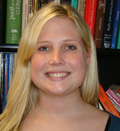 Masterton Awardees 2009 Masterton Awardees 2009
Congratulations to Amy Wood (above left) and Nicole Edwards (above right) who have been chosen to receive the 2009 Masterton Awards in Criminal Justice and Sociology respectively. Named after the department’s first chair, the George Masterton Award is given annually to graduating seniors for outstanding academic achievement, significant contributions to the department and campus, and for intellectual promise. The awards will be presented at the Honors Convocation on May 14th. Amy Wood is a Criminal Justice major with a minor in Sociology. As an Honors College student and Vice-President of the Criminal Justice Organization, Amy has distinguished herself as an active student leader and citizen. Amy is also enrolled in the BA/JD Dual Degree Program and plans to attend law school in the future. Nicole Edwards is a Sociology major and works as project coordinator for a wireless network service. She has worked as a research assistant for Professor Bluebond-Langner and says she learned a great deal about research techniques and enjoyed feeling a part of the anthropologist’s world. Ultimately, Nicole intends to become a construction manager in the wireless construction industry and manage the building/installation of cellular sites.The department extends its hearty congratulations to both.
Our computer lab has grown
We now have two more computers in the lab for student use. There are a couple of differences between them and the existing computers. The new ones use wireless technology, which means that logging on to the Internet will require you to enter your NetID and password. Also, as with the computers in the rest of the student labs around campus, you will not be able to save any files to these computers, so remember to bring an external storage device (e.g. a flash drive) with you if you want to save your work.
Being DeViAnT
In Dr. Humphries’ Deviance course, students just finished their papers on “being deviant” that required them to maintain a deviant identity for 12 hours and to come to class in their deviant identities. The picture to the left, a soldier from Star Wars is the student winning the deviant identity, a soldier from Star Wars. This student put the costume on, came to class, showed up at his job, and engaged “normal” people along the way. His prize was a Rutgers sweatshirt.
Internships
In spring of 2009 criminal justice undergraduate students performed internships at the following agencies: New Jersey Parole, City of Philadelphia Probation Department and Camden County Probation, the federal Drug Enforcement Agency (DEA), the Camden County Prosecutor’s Office and the Burlington County Investigative Division, the Public Defender’s Offices for Camden County, NJ and the U.S. 9th Judicial Circuit, and the Center for Family Services – Victim Services Division.
Students in the News
Two of our undergraduate students have won Minority Academic Careers or MAC Undergraduate Research Fellowships. The MAC program is a New Jersey State program administered by the New Jersey Commission on Higher Education, providing financial and programmatic assistance to academically outstanding undergraduates who are interested in pursuing academic careers in higher education. They are required to work on a research project under a faculty mentor. The two students are Linda Zekovitch, whose research topic is “Strangers in a Strange land: Restrictions on Dietary Intake and Impacts on the Khmer Refugee Population in the United States” and whose mentor is Dr. Sheila Cosminsky, and Daitza Frydel, whose research topic is “Yo Soy Boricua Pa’ Que Tu Lo Sepas (Puerto Rican Notions of Latino)” and whose mentor is Dr. Jon’a Meyer. The students receive a stipend and travel expenses to attend professional conferences. Linda is also a McNair scholar for this coming year and will spend the summer at New Brunswick studying research methods, working on her research project, and preparing for the GREs and graduate school. Daitza is currently a McNair scholar and spent last summer on the program in New Brunswick. The McNair program serves low-income, first generation college students and students from groups historically underrepresented in graduate education. The services provided are designed to prepare students with demonstrated academic potential, with the research and scholarship skills necessary for entry into doctoral studies. The department congratulates these two students on their achievements. We hope they will set an example and encourage other students to apply to these programs.
Criminal justice graduate students Jesse Levine and Kristin Curtis both had research proposals accepted for presentation at the 2009 American Society of Criminology conference in Philadelphia.
|
|
|
Departmental Website Offers Unique Features
To Help Students Do Well
If you’re not yet familiar with it, we recommend exploring our website, which provides a broad array of resources to assist you in finding the information you need and in doing well in your courses. As the illustration below shows, the website is divided into two sections, the departmental homepage and the web-enhanced curriculum, each with its own set of resource links. Check it out! There are resources to help you do well in your courses!
|
Departmental Homepage
Online Syllabi & Course Web sites
Masters Program in Criminal Justice
Current Newsletter
Faculty
Major Requirements
Minor Requirements
Course Schedule
Departmental Mailing List
Masterton Award
Advising FAQs
Poster Session Album
Faculty Resources
|
Web-Enhanced Curriculum HomepageOnline Syllabi & Course Web sites Masters Program in Criminal Justice Current Newsletter Plagiarism Policy and Guidelines Citation Guidelines Table and Graph Format Library Resources Online MicroCase Resources Online Research Tutorials and Videos Virtual Tours Recommended Web sites Writing in the Discipline Student Research Opportunities Streaming Audio and Video Project
|
Dept. E-Mailings: Periodic department mailings about events and departmental news are sent to all sociology and criminal justice majors. To receive them, be sure that you have declared sociology or cj as your major and be sure that the email address you wish to use is registered at the Rutgers student directory. The list is more fully described at the department’s E-Mailing List web page
|
June 11, 2009 8:56 . Contact Gail Caputo with comments or questions.
|